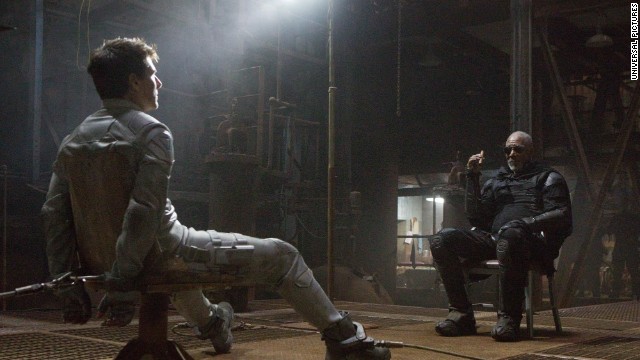
- "Oblivion" is a Tom Cruise sci-fi film; he stars as the last guy on Earth
- Critic Tom Charity says movie is shot beautifully but doesn't deliver
- Director lacks the poetic imagination to animate this requiem, Charity says
Editor's note: This review may contain spoilers.
(CNN) -- Remember when the movies held the impending extinction of human life on the planet as a worst-case scenario -- something that could and would be heroically averted, if only at the last second? Nowadays, the end times are only the beginning: an apocalyptic backdrop is something we're going to be seeing a lot of this year, so we might as well get used to it.
In the glossy, derivative, ambitious and fatally underpowered "Oblivion," Tom Cruise is the last guy on Earth. He's Jack, a technician -- a mechanic, really -- whose job is to fix broken down drones (in a cute touch he sticks the first one back together with chewing gum). In other words, he's a bit like WALL-E, and Andrea Riseborough is his latter day Eve.
They live in a billion-dollar birdhouse perched up above the clouds, and in a quaintly chauvinist set up, he reconnoiters the skies in a flashy starfighter prototype, while she sits at an interstellar telephone exchange and relays the commands of mission controller Sally (an irritatingly twangy Melissa Leo) from on high.
See, the remainder of the human race has taken refuge on a giant spaceship (it looks like a floating audio speaker, something that wouldn't be out of place on the cover of an '80s progressive rock album). The plan is to scoot over to Saturn just as soon as they have sucked up enough hydropower from the Earth's oceans to fuel the journey.
 Tom Cruise and Morgan Freeman's bromance
Tom Cruise and Morgan Freeman's bromance
 Tom Cruise denies talking about divorce
Tom Cruise denies talking about divorce
But why? Well, because of the alien invaders who destroyed the moon and threw the biosphere out of whack, that's why. As Cruise mournfully intones in the movie's lugubrious prologue, we won the war, but lost the planet.
That's what the drones are for: to kill off the last remaining hostiles, or "scavs," who have taken refuge on the edge of the radioactive wastelands that cover most of the globe.
That's more than enough backstory, I know, but there's much more to come out, even as Jack goes about his daily routine, tracking down lost drones, revisiting ruined New York landmarks (the top of the Empire State Building now sits at ground level on a sea of dust), and occasionally going AWOL himself to grapple with fragmentary memories of a beautiful girl (Olga Kurylenko), and a lost world he has no right to remember.
The story is officially credited to an unpublished comic book by the film's director, Joseph Kosinski. But if you poured all the most memorable sci-fi films from the past half century into a blender, from "2001: A Space Odyssey" and the original "Planet of the Apes" all the way down to last year's "Prometheus," you would probably wind up with something very similar and equally synthetic -- though quite possibly more exciting.
While he immerses us in an often dazzling futurescape, for the most part Kosinski ("Tron: Legacy") lacks the poetic imagination to animate this requiem for a dying world -- comparisons with "WALL-E" are certainly not to this film's advantage -- and fails to convince us that he genuinely cares about the fate of his characters, let alone the planet. The movie's few action scenes are competent but unlikely to wow any battle-seasoned gamers out there.
Kosinski does produce one rabbit from his hat, a real surprise late in the game that sends the movie for a loop, but also undermines a good deal of the credibility he's worked hard to build up over the preceding hour and a half or so. Like "Prometheus," this is another of those earnest, overdetermined spiritual allegories that falls apart in the rear-view mirror.
It is certainly nice to look at though.
Director of photography Claudio Miranda was last seen picking up an Academy Award for his breathtaking work on "Life of Pi," and his images of an Earth turned to ash are almost as alluring. They're enough to lend the picture a sense of scope and even grandeur, but they can't paper over the cracks running right through its core.
"Oblivion" shoots for the moon and falls short.